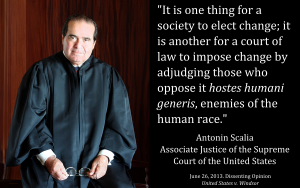Polygamists Win in Court Using Trail Blazed by Same-Sex Marriage
 Last December U.S. District Judge Clark Waddoups issued a ruling effectively decriminalizing polygamy in Utah.
Last December U.S. District Judge Clark Waddoups issued a ruling effectively decriminalizing polygamy in Utah.
Under Utah law, a person may not file for more than one marriage license or cohabit with more than one “spouse.” The law is intended to prevent both state-recognized polygamy and the unofficial polygamy practiced by some people in which a man is legally married to one woman, but has other “wives” to which he is not legally married.
Kody Brown and his wives, stars of the reality TV show “Sister Wives” depicting their polygamous lifestyle, filed suit against the State of Utah over the law, and last December Judge Clark Waddoups struck the portion of the law preventing people from living together in polygamous relationships; Judge Waddoups did, however, leave the portion of the law preventing a person from filing for more than one marriage license. Since most polygamous groups do not typically file for multiple state marriage licenses anyway, this effectively decriminalizes polygamy in the State of Utah.
A stay was placed on Judge Waddoups’ initial ruling last year, pending a decision on whether or not Utah owed the Browns any financial compensation. This week, Judge Waddoups ruled the State of Utah must pay the Browns’ attorney fees, and put the full force of his December ruling into effect.
This ruling is significant, because the logic employed by Judge Waddoups decriminalizing polygamy is the very same logic being used to advance same-sex marriage around the country. Gay activists have long dismissed claims that same-sex marriage would lead to polygamy as “fear mongering.” However, Judge Waddoups’ ruling owes a lot to the U.S. Supreme Court’s Lawrence v. Texas ruling which has been used over and over again in court to argue against everything from the federal Defense of Marriage Act to state marriage amendments.
Judge Waddoups’ ruling largely hinges on the following: (more…)

 The Freedom From Religion Foundation is drumming up controversy in Arkansas again–this time over pizza.
The Freedom From Religion Foundation is drumming up controversy in Arkansas again–this time over pizza.